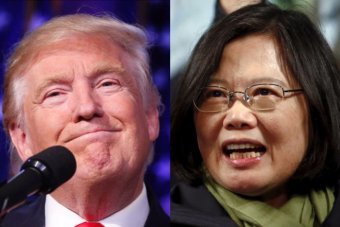Donald Trump speaks to Taiwan's leader Tsai Ing-wen in 'historic' first contact since 1979
Updated
US President-elect Donald Trump has spoken by phone with Taiwanese President Tsai Ing-wen, a move that is likely to infuriate China and complicate US relations with Beijing.
Key points:
- No US president or president-elect had been in contact with Taiwan since 1979
- A spokesman for the Taiwanese leader said both sides had agreed to the contact ahead of the call
- Mr Trump spoke to four leaders on Friday, including Philippines President Rodrigo Duterte
The call was the first such contact with Taiwan by a US president-elect or president since President Jimmy Carter adopted a one-China policy in 1979.
Mr Trump said on Twitter that the Taiwanese leader initiated the call, saying Ms Tsai called to congratulate him on winning the presidency.
Alex Huang, a spokesman for Ms Tsai, said: "Of course both sides agreed ahead of time before making contact."
The Trump transition team said in a statement that the two leaders noted that "close economic, political and security ties exist between Taiwan and the United States".
Taiwan's presidential office said the two leaders touched on strengthening bilateral interactions and establishing closer co-operation.
There was no official comment from China, which is likely to be angered because it views Taiwan as a renegade province, but Chinese Foreign Minister Wang Yi blamed Taiwan for the exchange, state media reported.
"This is just the Taiwan side engaging in a petty action, and cannot change the one-China structure already formed by the international community," Mr Wang was quoted as saying.
"I believe that it won't change the longstanding 'one China' policy of the United States Government."
Washington is Taiwan's most important political ally and sole arms supplier, despite the lack of formal diplomatic ties.
The call comes at a time of worsened Taiwan-China relations since the election of Ms Tsai's pro-independence Democratic Progressive Party (DPP) earlier this year.
The White House responded to the call by saying that "longstanding policy" on China and Taiwan had not changed.
"We remain firmly committed to our 'one China' policy," said Ned Price, a national security spokesman for President Barack Obama.
"Our fundamental interest is in peaceful and stable cross-Strait relations."
A former diplomat who helped arrange the call and did not want to be identified said Chinese officials he spoke to beforehand said they were not troubled by the call because Mr Trump was not yet president. Mr Trump takes office on January 20.
Ms Tsai was one of four world leaders Mr Trump spoke to on Friday, raising questions about whether he is effectively co-ordinating with the US State Department before reaching out to leaders overseas.
Gerrit van der Wees, a former Dutch diplomat who lobbies on behalf of Taiwan, said the call indicated Mr Trump would be less bound by conventions and restrictions in foreign policy and was "signalling a broader change in US policy towards Taiwan".
Trump 'flying by the seat of his pants'
Advisers to the Republican President-elect have indicated that he is likely to take a more robust policy toward China than Mr Obama, a Democrat, and that Mr Trump plans to boost the US military in part in response to China's increasing power in Asia. However, details of his plans remain scant.
Senator Chris Murphy, a member of the Senate Foreign Relations Committee, said Mr Trump was entitled to change policy, but his approach was potentially dangerous.
"Foreign policy consistency is a means, not an end. It's not sacred. Thus, it's Trump's right to shift policy, alliances, strategy," Mr Murphy, a Democrat, said in a note on Twitter.
"What has happened in the last 48 hours is not a shift. These are major pivots in foreign policy w/out any plan. That's how wars start."
Also on Friday, Mr Trump also spoke to Philippines President Rodrigo Duterte, inviting him to the White House next year during what a Duterte aide said was a "very engaging, animated" phone conversation.
Mr Duterte has openly insulted President Obama, who cancelled a planned meeting with him in September.
A statement issued by Mr Trump's transition team made no mention of the invitation. The transition team said that Mr Trump also spoke on Friday to Afghan President Ashraf Ghani and Singapore Prime Minister Lee Hsien Loong.
Winston Lord, who was US ambassador to China from 1985–89 and is a former assistant secretary of state for East Asian and Pacific affairs, said the strategic importance of the Taiwan call was unclear.
"Like so many things with Trump, who knows? This man is ignorant about foreign policy and is flying by the seat of his pants, so it is difficult to assess the significance," he said.
"Having said that, I have no problem with his talking to Madame Tsai; Taiwan is a good friend and although our relations are unofficial, I think it's important to maintain close bonds with Taiwan."
Mr Trump and Chinese President Xi Jinping spoke by telephone on November 14. President Xi stressed that cooperation was the only choice for relations between the world's two largest economies, and Mr Trump said that the two had established a "clear sense of mutual respect".
Mr Trump lambasted China throughout the US election campaign, drumming up headlines with pledges to slap 45 per cent tariffs on imported Chinese goods and label the country a currency manipulator on his first day in office.
Douglas Paal, a former official of the US National Security Council who served as US representative to Taiwan from 2002–2006, said nothing Mr Trump had said in the campaign suggested he wanted to rebuild the relationship with Taiwan at the expense of the China relationship.
"From the information I have so far, this is a standalone item, but the Chinese will feel the need to make a major protest so there isn't more of this," he said.
Reuters
Topics: government-and-politics, us-elections, world-politics, united-states, taiwan
First posted







